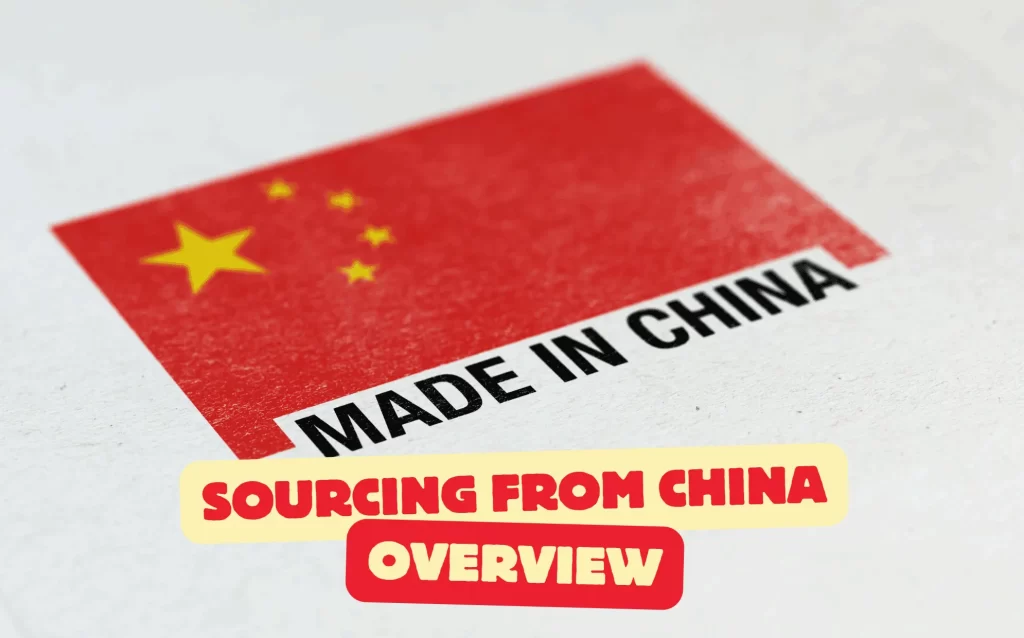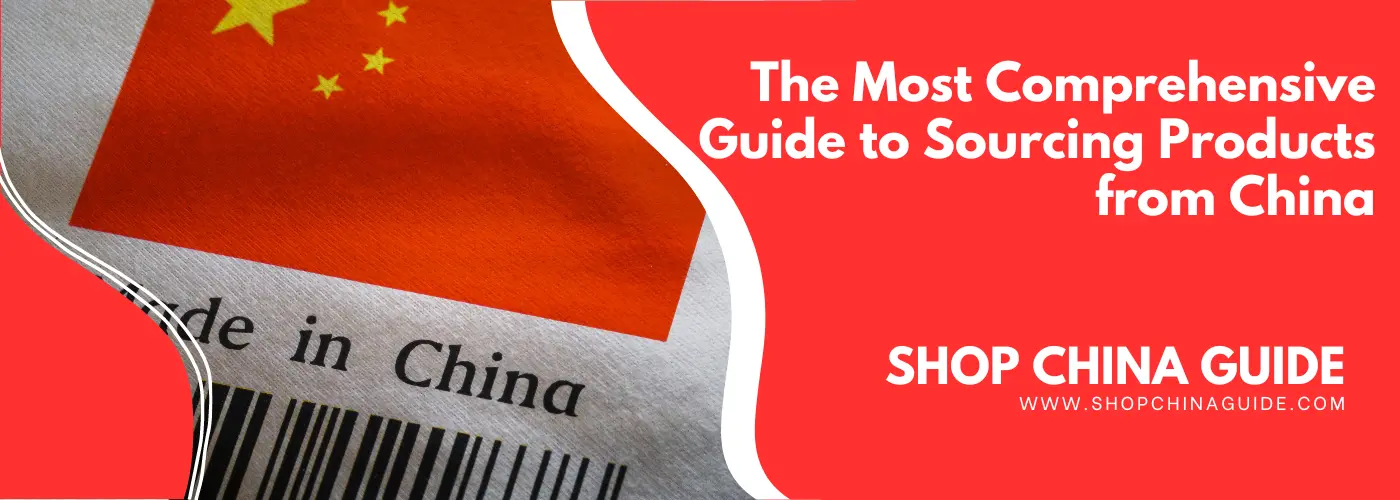If you’re searching for products to purchase or manufacturers to start a new business with, you surely know that China is a prime option for sourcing goods. China boasts a vast array of wholesale markets, such as the Yiwu Small Commodities Market and the Huaqiangbei Electronics Market in Shenzhen. Additionally, China’s e-commerce online marketplace is highly developed, with platforms like Alibaba and DHgate.
However, given the plethora of choices in the Chinese sourcing market, the cultural background, legal regulations, and language differences present a significant challenge for foreigners looking to source products from China.
Beyond guiding overseas individual consumers on shopping from Chinese retail e-commerce platforms, we also share knowledge and provide guidance for overseas businesses looking to purchase goods. Today, we have compiled the most comprehensive guide to sourcing products from China for you.
Overview and Foundations of Sourcing from China

China, as the world’s largest manufacturing nation, possesses a profound industrial foundation and a comprehensive supply chain system. For a long time, “Made in China” has been synonymous with high efficiency and cost advantage for various industries globally. Whether it is electronic products, textiles, machinery, or consumer goods, China’s manufacturing industry is capable of providing one-stop services from raw material procurement and processing to finished product export.
When sourcing from China, you can benefit from a vast array of product types, flexible production capabilities, and highly competitive pricing. The network of suppliers in China spans the entire country, especially in economically developed regions such as the Pearl River Delta and Yangtze River Delta, which boast world-class manufacturing clusters.
6 Advantages of Choosing China as a Sourcing Destination
Cost Advantage
China leads in production efficiency and economies of scale globally, along with a vast supply of inexpensive labor. This allows for significantly lower production costs compared to many other countries while maintaining high quality standards.
Mature Supply Chain
Years of export experience have cultivated Chinese suppliers’ expertise in production, logistics, and export, enabling them to meet complex and varied market demands.
Innovation Capacity
With technological advancements, China’s manufacturing industry is continually innovating and upgrading, now capable of producing products with higher technical content.
Quick Market Response
Chinese manufacturers can swiftly respond to market shifts, adjust production strategies, and shorten the time it takes to bring products to market.
Rich International Trade Experience
Chinese companies have extensive operational experience in international trade, familiar with trade rules and processes of various countries.
Policy Support
The Chinese government offers a range of policy supports, including tax incentives and trade facilitation, which further reduce the costs and complexity of procurement and exporting.
5 Strategies for Sourcing from China
1. Direct Purchase from Manufacturers
Advantages: The most significant benefit is the reduction of intermediary links, which lowers costs. Direct communication with producers makes it easier to control product quality and production progress, and there is more room for price negotiation.
Disadvantages: This requires more time and resources to conduct market research and confirm the reliability of the factory. Language and cultural differences may become communication barriers, and it can be challenging for companies without a purchasing office in China or those with small purchase volumes.
2. Using a Sourcing Agent
Advantages: Sourcing agents often have a deep understanding of the local market and can help find cost-effective suppliers while managing the entire procurement process, including quality control and logistics arrangements.
Disadvantages: This introduces additional costs since agent services are not free. If not chosen carefully, there may be encounters with unprofessional or dishonest agents, leading to an inability to guarantee product quality and delivery times.
3. Using a Sourcing Freelance
Advantages: Utilizing freelance purchasers brings high flexibility and cost-effectiveness as they can quickly adapt to project needs and provide specialized knowledge across various industries without the need for long-term financial commitments. Freelancers often have deeper market insights due to serving multiple clients.
Disadvantages: Collaborating with freelancers may pose confidentiality risks, and managing them remotely can present significant challenges. Ensuring quality and accountability becomes more complex, especially in international procurement. Their preference for short-term projects may impact the stability of long-term cooperation.
4. Through Suppliers
Advantages: Suppliers often provide a broader range of product selections and more flexible order volume requirements, suitable for small batch and diversified purchasing needs.
Disadvantages: The price is usually higher than purchasing directly from factories because suppliers need to earn a margin. Also, control and understanding of the production process may not be as in-depth as direct cooperation with factories.
5. Purchasing via Online Wholesale Platforms like Alibaba
Advantages: These platforms offer a vast selection of suppliers, are convenient and quick to operate, and suppliers can be filtered based on reviews and transaction history. The platforms usually provide some level of transaction security.
Disadvantages: The quality of products can be inconsistent, requiring careful selection and verification of suppliers. The platform’s rules and procedures may also limit some purchasing freedoms, such as price negotiation and customized services.
How to find Manufacturers in China?

Finding manufacturers in China typically involves the following steps:
- Market Research: Begin with a thorough analysis of your product market in China, including the main production hubs, industry leaders, and prevailing market prices.
- Online Platforms: Utilize B2B platforms such as Alibaba and Made-in-China, where a multitude of Chinese manufacturers are listed. You can filter by product category, company size, and other criteria.
- Trade Shows: Attend industry-specific trade fairs like the Canton Fair to communicate directly with manufacturers, gaining insight into their products and manufacturing capabilities.
- Sourcing Agents: If you are unfamiliar with the Chinese market, consider employing sourcing agents to assist in finding suitable manufacturers. They typically have an in-depth understanding of the local market and can provide quality inspection and logistics services.
- Factory Visits: After identifying potential manufacturers, it is crucial to conduct on-site visits. This allows you to directly assess the factory’s production capacity and quality control processes.
- Business Negotiation: Once you have pinpointed your target manufacturers, engage in detailed business negotiations covering price, minimum order quantities (MOQ), delivery schedules, and after-sales service.
- Sample Confirmation: Request samples before placing bulk orders to ensure the product meets your quality and specification requirements.
- Contract Signing: Finally, ensure that all terms and conditions are comprehensively detailed in the contract, including payment terms, quality standards, delivery timelines, and liabilities for breach of contract.
How to find Suppliers in China?
Finding suppliers, much like finding manufacturers, can be approached in the following ways:
- Online Platform Search: Use online B2B platforms such as Alibaba, Made-in-China, and Global Sources. These platforms host a vast database of suppliers, allowing you to filter by product category, response speed, transaction history, and buyer reviews.
- Trade Shows: Attend trade shows in China, such as the Canton Fair, which offer the opportunity to directly contact suppliers, see physical products, and negotiate on the spot.
- Industry Directories and Databases: Consult directories and databases related to your industry, which usually contain detailed information about suppliers that you can contact directly.
- Chambers of Commerce and Industry Organizations: Get recommendations through Chinese chambers of commerce and industry organizations, which can provide a list of reputable suppliers within the industry.
- Word of Mouth and Recommendations: Find suppliers through industry contacts and reputation. Often, good suppliers are found through customer recommendations.
- Specialty Markets and Wholesale Markets: There are many specialty and wholesale markets in China. Visiting these markets in person can sometimes lead to discovering unexpectedly good suppliers.
Tips to Consider When Sourcing from China
Preventing Fraud by Manufacturers or Suppliers
When sourcing from China, as with anywhere else in the world, preventing fraud is a primary concern. There are numerous manufacturers and suppliers in China, varying greatly in size and situation. It is crucial to thoroughly understand their background, such as whether they have a legitimate business license and the actual conditions of their company premises, as well as their reputation within the industry.
If you decide to make a large purchase, it is advisable to choose to conduct an on-site visit whenever possible, to avoid financial losses.
Effective Communication with Suppliers
When communicating with Chinese suppliers, it’s crucial first to respect and understand Chinese culture and business practices. Establishing trust and respect is the foundation for long-term cooperation.
Moreover, clear communication and contract terms can reduce misunderstandings and conflicts, especially by specifying product specifications, quality requirements, delivery times, and payment terms in detail. Creating contract documents in both languages and maintaining ongoing communication and feedback also help build a stable and reliable supply chain relationship.
Balancing Price and Quality
Price and quality are eternal topics in procurement, and balancing the two is crucial. Purchasers should first clarify their product’s quality standards while understanding the market’s price levels. Key to this process is honest communication with suppliers, clearly stating your quality requirements and price budget. On this basis, by comparing samples and quotations from different suppliers and conducting in-depth cost analyses, you can ensure obtaining the best prices without sacrificing quality.
It’s important to note that the price range of Chinese products is vast, and products that are too cheap might be of poor quality. During the procurement process, attention should be paid to distinguishing this.
Requesting Samples of the Products to be Purchased
Before making a purchase, requesting product samples from suppliers is an essential step. This allows you to directly assess the quality and details of the product, and also provides a reference for subsequent bulk orders. When requesting samples, you should clearly specify your requirements, including product specifications, color, size, and other relevant information, to ensure that the samples you receive meet your expectations. It’s particularly important to note that product standards in China may differ from international standards. For example, Chinese clothing sizes differ from those in the US, and the voltage and frequency of Chinese electrical appliances may vary from those in other countries. Be sure to pay attention to these differences.
Considering the cost of samples and logistics, you may need to negotiate the sample fee with the supplier. Some suppliers might offer free samples, but in most cases, you might need to bear the cost of the sample and shipping. Once the sample is received, carefully inspect every detail of the sample, and if necessary, communicate with the supplier in a timely manner to make adjustments, ensuring that the final bulk-produced products can meet your requirements.
Pay through legal channels to avoid illegal remittances
When transacting with suppliers, it is crucial to choose legal payment methods, such as bank transfers, credit cards, or third-party payment platforms. These methods provide transaction records and legal protection, making the payment process more transparent and traceable.
At the same time, consider the convenience and cost of different payment methods. For example, bank transfers are secure but might be expensive, while third-party payments like PayPal are quicker and less costly. Additionally, clarifying payment terms, such as payment timing and amounts, can prevent misunderstandings and disputes. For large transactions, staged payments are a good way to reduce risks.
Choosing Professional Freight Services
Choosing the right freight company is extremely important. Check their qualifications, reputation, and reviews from other businesses. Ensure they have a strong network in the destination country and can handle customs and regulatory requirements.
When selecting a freight company, also consider those recommended by the manufacturer or supplier. Contact multiple freight forwarders yourself to get quotes for comparison. Compare not just the prices, but also the delivery times, packaging of goods, and modes of transportation. It’s also wise to insure the goods for their full value to ensure complete security.
Advantages and Disadvantages of Using Alibaba and Sourcing Agents

China boasts numerous B2B online purchasing platforms, with Alibaba as a prime example, allowing us to compare its advantages and disadvantages against using sourcing agents.
Alibaba
Advantages
- Wide Range of Products: As a vast B2B platform, Alibaba offers almost all categories of products, meeting diverse procurement needs.
- Convenience: The online platform is user-friendly, enabling quick searches and comparisons of products and prices from different suppliers.
- Transparency: Information about suppliers and user reviews are relatively transparent, allowing buyers to make informed decisions based on this data.
Disadvantages
- Quality Variability: With a multitude of suppliers, product quality can vary, necessitating buyers to screen and verify independently.
- Language and Cultural Barriers: International buyers may face challenges in communication due to language and cultural differences with Chinese suppliers.
- Logistics and After-sales Issues: Handling logistics and after-sales services on one’s own can be complex, requiring specific experience and resources.
Sourcing Agents
Advantages
- Professional Services: Sourcing agents typically offer one-stop services, including market research, supplier selection, quality control, and logistics arrangements, easing the burden on buyers.
- Quality Assurance: Professional quality inspections and supplier management reduce the risk of receiving inferior products.
- Communication and Coordination: Sourcing agents can act as a bridge between buyers and sellers, helping to overcome language and cultural differences for effective communication.
Disadvantages
- Increased Costs: The service fees of sourcing agents may add to the overall procurement costs.
- Dependency: Over-reliance on agents may lead to insufficient understanding of the market and suppliers by the buyers.
In summary, Alibaba is suitable for buyers with specific product needs who wish to directly control the procurement process, while sourcing agents are more fitting for businesses that require comprehensive procurement services, focusing on quality control and logistics coordination.
Conclusion
If you’re purchasing from China for the first time, consider reducing the order quantity initially. Take the opportunity to familiarize yourself with the entire procurement process. As mentioned in the article, try making purchases on a smaller scale. Once you’re comfortable with the procurement process and have established trust with your suppliers or manufacturers, you can then scale up your purchases and expand your business.
As you become an expert in sourcing from China, you’ll find that operating your own business with products sourced from China can be a highly profitable venture.




